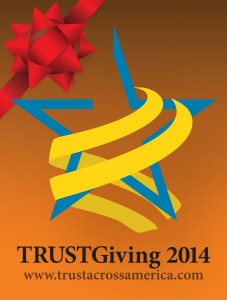There is no doubt a link exists between generosity and trust. One of the great testaments to this can be found in a video produced by a surgeon named Mario Alonso Puig. But many people forget that building trust not only requires reciprocity but also a healthy balance between favors and greed.
In my current work, many of my professional contacts are very generous with their time, as am I. In fact, over the years (trust takes time and is built in incremental steps) we have built reciprocal relationships that are win/win for everyone in this growing circle, and often without the words “trust-building” ever being mentioned.
But as Trust Across America-Trust Around the World’s audience and network has grown, we have fallen victim to what I call the “favor phenomenon”, those “simple requests” usually (but not always) from virtual strangers that flood our daily inbox:
1. Will you endorse my book?
2. Can I be a guest on your radio show?
3. Can you make an introduction to __________?
4. Can you help me raise money?
5. Can you get me a speaking engagement?
6. Will you come to my conference and pay to do so?
7. Will you donate to my charity?
8. Will you follow me on Twitter, Facebook and LinkedIn?
Can you, will you, can you, will you? One pattern I’ve noticed is these folks, more often than not, have never engaged with us in the past, and may be the same people who claim to be “very busy.” So busy, in fact, that they have no time to build relationships.
Imagine how much faster trust might be built if these “favor askers” lead with trust!
1. I’ve read your book and just wrote an endorsement for you on Amazon.
2. I know of a media opportunity that I believe would be a perfect fit for you.
3. I would like to introduce you to _____________.
4. I want to donate to your cause.
5. I think you would be the perfect speaker at this event.
6. Please be my guest at my conference.
7. I’d like to make a donation to your favorite charity.
8. I follow you on Facebook, Twitter and LinkedIn and have spent time familiarizing myself with the work you do. Here’s an example of your work that resonates with me.
And by the way, would you mind doing a small favor for me?
So why doesn’t this happen more often? Because most people, in their all-consuming quest to “get” something that provides a short-term benefit ONLY to themselves, also forget (or never learned) that:
- Leading with trust is essential in every healthy relationship, be it personal or business
- Trust is reciprocal
- Trust takes time to build.
It’s quite simple and certainly not rocket science. Try it. The long-term benefits may surprise you.
Barbara Brooks Kimmel is the Executive Director of Trust Across America-Trust Around the World whose mission is to help organizations build trust, and runs the world’s largest membership program for those interested in the subject. She is also the editor of the award winning TRUST INC. book series and the Executive Editor of TRUST! Magazine. In 2012 Barbara was named “One of 25 Women Changing the World” by Good Business International.
Our annual poster, 52 Weeks of Activities to Increase Organizational Trust is available to those who would like to support our work by making a small donation.
Did you know we have published 3 books in our award-winning TRUST Inc. series. They are yours when you join our Alliance.
Copyright 2015, Next Decade, Inc.




Recent Comments